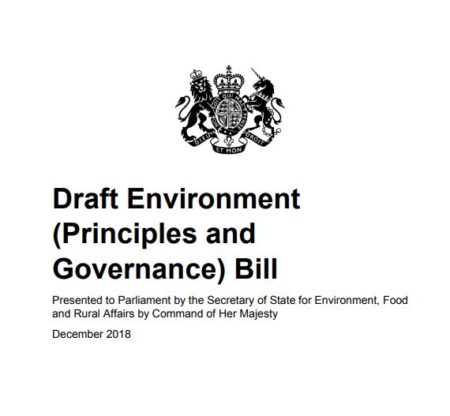Defra has published its draft Environment Bill, which sets out how the government will be held accountable on environmental principles once the UK leaves the European Union.
The draft, published yesterday (December 19), sets out clauses on environmental principles and governance “to be included in an ambitious, broader Environment Bill set for introduction next year”.
It states that a body called the Office for Environmental Protection (OEP) will be established post-Brexit, which will replace the role of the European Commission in upholding environmental targets.
According to the draft, the OEP must “have regard to the need to act objectively, impartially, proportionately and transparently”.
The draft says that the OEP must also prepare a strategy that sets out how it intends to exercise its functions, including how to prioritise cases and deal with complaints.
Alongside this, yesterday’s draft says that the OEP must prepare a progress report for each annual reporting period, which outlines “progress made in improving the natural environment” in accordance with the current environmental improvement plan.
Procedure
According to the draft a person may make a complaint to the OEP if they believe that a public authority has failed to comply with environmental law.
“A complaint under this section may not be made by any person whose functions include functions of a public nature,” the bill says.
The OEP may then decide to carry out an investigation and must notify the public authority of the investigation, and prepare a report once finished. This will set out its conclusions, reasons for it and recommendations in light of the conclusions.
Enforcement
The draft bill states that the OEP may make a “review application” once publishing a decision notice to a public authority to comply with environmental law.
For England and Wales or Northern Ireland, this will be an application to the High Court for judicial review, or in Scotland, an application to the supervisory jurisdiction of the Court of Session.

A new body will replace the European Commission (pictured) and other European Courts in holding the government to account for failure to meet its environmental obligations post-Brexit
Since the vote to leave the EU in 2016, some in environmental sectors have expressed concern at who would hold the government to account with regards to environmental law, such as reaching targets.
The draft explains that funding for the newly-created OEP will come “through grant-in-aid and provided for as part of Defra’s overall Estimate, paid for out of the Consolidated Fund”.
The final amount and timing of financial implications are yet to be confirmed.
The draft said: “The body will need to be sufficiently funded to fulfil its statutory functions successfully and hold the government to account on the environment.”
Some of the costs expected and laid out in the draft include one-off setup costs, including for public appointments, staff recruitment, and enabling IT systems and governance costs, including remuneration and expenses for non-executive members.
Reaction
Commenting on the details of the draft proposals, Mr Gove said the body will help with pledges earlier in the year in the 25 year Environment Plan.
“We have published our draft clauses for the Environment Bill which place our environmental ambition and accountability at the heart of government,” he explained.
Mr Gove added: “They set out how we will create a pioneering new system of green governance, placing our 25 Year Environment Plan on a statutory footing. We will explore options for strong targets to improve our environment, and provisions on air quality, waste and water resource management, and restoring nature.”
The post Draft bill sets out ‘environment watchdog’ details appeared first on letsrecycle.com.
Source: letsrecycle.com General



